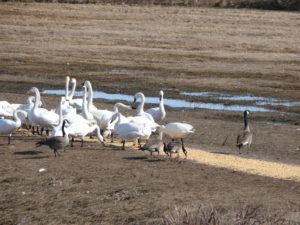Diseases and pathogens are always a risk, but with Avian Influenza and PEDv outbreaks in Ontario extra vigilance is required. The poultry and swine industry are doing their part to prevent spread of the diseases. However, as farmers, custom work operators and agronomists begin spring field work, including manure application, it is extremely important that good biosecurity is followed by everyone.
Avian Influenza is a highly infectious viral disease that affects almost all species of birds. The H5N2 strain has been identified in Ontario (and in various states in the USA) and wild migratory birds are the suspected carrier. Bird feces and respiratory secretions containing the virus are spread mainly by humans and contaminated equipment and potentially, to a much smaller extent, cats, dogs and rodents. For humans, clothing, footwear and hands can move the virus, while on vehicles tires, manure handling equipment, and shared equipment used for vaccination, loading or transport are all potential conduits for spreading the disease. Although currently centered in Oxford county, migratory birds don’t follow county boundaries which means that precaution must be taken by everyone.

In manure, the avian influenza virus can survive for 30 to 35 days at temperatures of 4oC and up to 7 days at 20oC. The virus can remain viable for longer periods in liquid manure. During winter months the virus remained viable for over 100 days in research studies.
Heat, dryness and extremely high or low pH can destroy the virus’ ability to infect. In barns a method used to inactivate the virus included heating the barn to 38oC (100oF) for a week. Viability of the virus “deposited” by infected migratory birds in fields will be reduced as winter conditions transition to spring. Just another reason to look forward to the spring/summer warmth and sunshine.
Use of disinfectants such as Virkon, Accel, VIROCID®, Bisentry, Biosolve Plus, Biofoam, etc are another method used to eliminate or prevent the spread of the virus. Ensure adequate contact time and concentrations by reading the label and ensuring proper use.
As farmers, custom work operators and agronomists begin spring field work, including manure application, it is extremely important to follow proper biosecurity practices. Be conscious of where you are driving and walking. Water, wet soil, and feces can become contaminated with AI and linger after the migrating flock has moved on. Soil and wild bird feces can stick to tires and undercarriages of vehicles including ATVs and travel for miles. Below are some key biosecurity protocols to keep in mind.
• Washing vehicles between farms is ideal and should be considered essential before visiting a poultry farm during this period of heightened biosecurity.
• Pay special attention to the vehicle’s tires.
• For footwear, remove obvious mud and organic matter first and then scrub boots especially the bottom tread with a brush and hose. Use disinfectants such as Virkon, Accel, VIROCID®, Bisentry, Biosolve Plus, Biofoam, etc. Ensure adequate contact time and concentrations – read the label!
• Also be sure to clean any equipment used on farm that could become contaminated, e.g. soil probes, shovels.
• When on poultry farms, avoid driving near barns that contain live birds if possible.
• Drive slowly when near barns to minimize dust.
• Look for designated visitor parking.
• Avoid parking by exhaust fans and air inlets unless required as part of loading or unloading.
• Do not enter any building on the property except where you need to deliver service unless you have the express permission of the farmer or farm manager.
• Keep your own records identifying where you have been and when.
Some species of wild birds shed the AI virus in the spring and others in the fall. In other words, keep this list handy so that these biosecurity measures are also in place for fall fieldwork.
Additional information can be found at:
Canadian Food Inspection Agency – CFIA AI Page
Chicken Farmers of Ontario – http://www.ontariochicken.ca/News-Events/Whats-New.aspx
Iowa Manure Matters – http://www.extension.iastate.edu/pages/communications/epc/su06/disposal.html